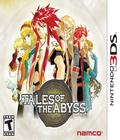Since the days of the original PlayStation, one of the benchmarks for newly released consoles has been the polygonal Japanese role-playing game. For over a decade, due to the precedent established by Final Fantasy VII, Japanese RPGs held the reputation of being the pinnacle of spectacle, showing off everything the system had to offer. In many cases, this is actually still true; witness the triumphs that are the PlayStation 3's Valkyria Chronicles or the Wii's Xenoblade Chronicles.
However, also witness the sad cases of games like Evolution and Enchanted Arms, games that sold themselves at least partly on the premise of being the "first RPGs" released for their host consoles (Dreamcast and Xbox 360, respectively). Their "first" status may have allowed early adopters to grin and bear it as they bought these titles, but eventually, they became a target of extra scrutiny. While they offered some middling-to-decent "next generation" visuals, general consensus ruled that the overall content just wasn't up to snuff.
Possibly sensing this, Namco, instead of creating an all-new RPG from the ground up for the Nintendo 3DS, simply up-ported one of its PlayStation 2 titles. On paper, this is actually a sound business move: gain revenue from a newly established and RPG-starved console install base using its established and well-respected RPG series.
If only ... well, almost everything hadn't gone wrong.
The first mistake was, sadly, the choice of title. Tales of the Abyss shares the greatest of its design credits with the development team that created Tales of Symphonia, an example of gaming Marmite. Ask one person who played it, and you'll be regaled with tales of how it was one of the best RPGs of the last console generation; ask another (such as myself), and you'll hear about how the character designs were utterly boring, how the battle system was slow and clunky compared to both past and future games in the series, and how the story meanders until it decides to finally wake up and approach decency. In terms of the latter, history repeats itself.
The plot centers on Luke fon Fabre, a young man who not only embodies the standard RPG amnesia trope, but also has been under house arrest for his own safety for the past seven years. This results in a character who barely knows himself as a person, much less how the world works. This results in the first five hours of the game asking players to guide around one of the most insufferable, thick-headed characters in the genre. It's only around that time that the story stops dragging its heels.
You finally manage to get more than two characters in your party, and Luke gets the slightest idea that maybe he should shape up because there are a lot of things going on in the world that are bigger than his ego. There are a whole lot of twists that I will not spoil; some characters are far more tolerable than others, existential identity crises are had, evil empires rear their heads, and so forth. However, it's going to take a lot of patience to get to the game's redeeming points without throwing the cart across the room unless you have a supreme tolerance for this type of story.
Already, we're looking at unlikeable characters and a story that meanders and angers instead of compels. Other mechanics don't fare too well, either. Once the story finally ramps up, you're plopped into a world with no map of any kind, and many of the surroundings look alike, so it's frustrating to reach objectives. The combat system, which consists of semi-real-time fighting commands, is slow, inefficient and somewhat clunky until your party is full. At that point, it becomes serviceable due to the sheer amount of attacks and spells that your party is able to output.
Otherwise, if you've played Symphonia, you've played this. The mid-game conversation skits — a hallmark of the series, which normally provide some welcome characterization — are a hindrance here, since there's no option to speed through the dialogue once you're done reading it. Press a button, and the whole skit gets skipped, so if you care about story, be prepared to wait through whole minutes of silent mouth movements. This breaks up the flow of the game like you wouldn't believe.
On a base level, the game contains decent graphics, even for a PS2 port, and a decent English voice dub and soundtrack. Everything about the original material is serviceable. Let's say you're a fan of the game, or (like me) you simply wanted to play it since you missed out when it was on PS2. Does it still hold up? Sadly, no. This is the textbook example of a rushed and even botched port. There are comparable load times despite the cartridge format, and button mapping can be awkward (especially on the map screen). Then we get to the 3-D, which is the worst implementation I've seen on the system to date. The way the layering works between the background, the on-screen characters, and the dialogue bubbles means that different objects pop in and out during cut scenes and spontaneous dialogue exchanges, easily resulting in headaches. There are even ghosting and afterimages in 3-D mode. It all comes off as amazingly sloppy work, and it renders the game unplayable in 3-D for even short stretches of time.
For Tales of the Abyss, what we're left with is a bad port of an old, polarizing game that is mediocre at best and dangerous at worst. Given all of its flaws, there's really not much of a reason for this port to exist, outside of it being The First Pretty RPG for the 3DS. If that's enough for you, then by all means, grab this on the cheap and play it in 2-D mode. Otherwise, you're better off waiting for games made expressly for the system.
Score: 6.0/10
More articles about Tales of the Abyss











 Tales of the Abyss, based on the PS2 RPG, delivers full 3D support and use of the dual screens, offering a new gameplay experience and brings players closer to the action.
Tales of the Abyss, based on the PS2 RPG, delivers full 3D support and use of the dual screens, offering a new gameplay experience and brings players closer to the action.




























